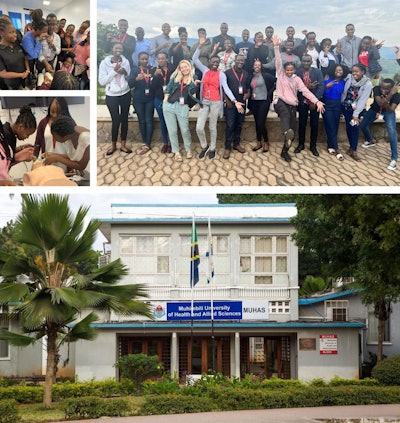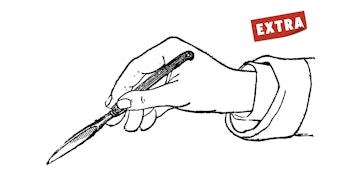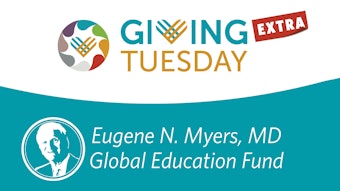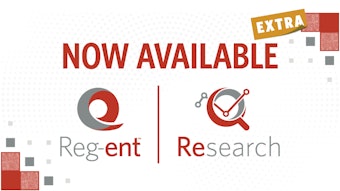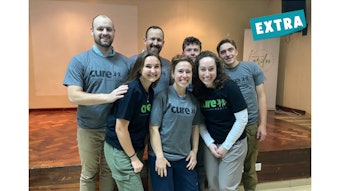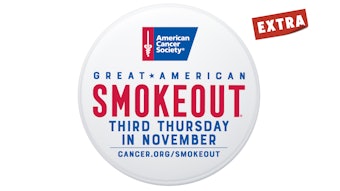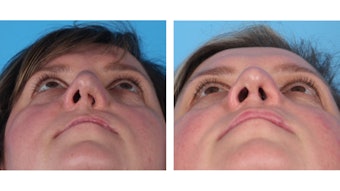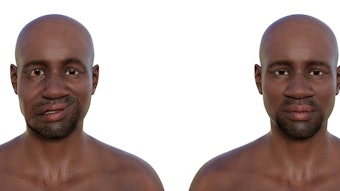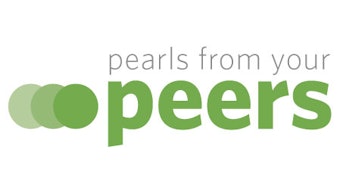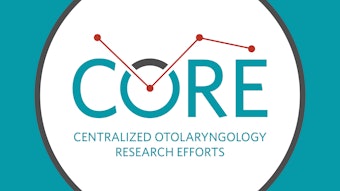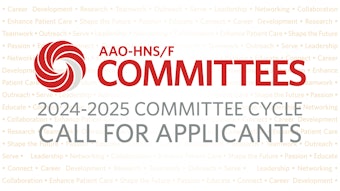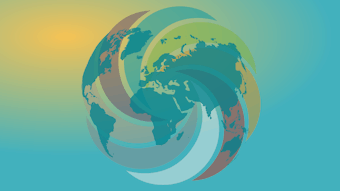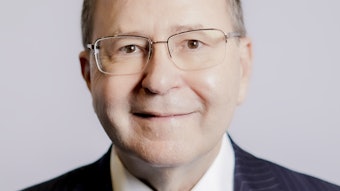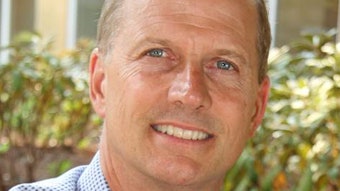Humanitarian Efforts Help Bridge Gaps Across the Globe
Physicians from around the world share their perspectives working in lower resourced countries.
Humanitarian efforts often help bridge knowledge, training, and skills gaps. While beneficial for the patients who receive the life-changing treatments and procedures, these efforts are often just as valuable, if not more, for the future and current practicing physicians who engage in humanitarian aid.
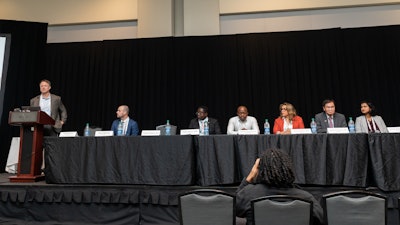 Humanitarian Efforts Committee Chair, Gregory J. Basura, MD, PhD, moderates the Medical Perspectives from Global Physicians panel during the Humanitarian Efforts Forum.
Humanitarian Efforts Committee Chair, Gregory J. Basura, MD, PhD, moderates the Medical Perspectives from Global Physicians panel during the Humanitarian Efforts Forum.
“There’s one thing that you cannot actually quantify, which is the relief that these humanitarian efforts bring,” said Isaac Barnor, BSc, MBChB, MGCPS, of Ghana, during the “Medical Perspectives from Global Physicians” panel that was part of the Humanitarian Efforts Forum at the AAO-HNSF 2023 Annual Meeting & OTO Experience in Nashville, Tennessee.
“We can talk about equipment, knowledge, and all of that, but the relief and comfort that [these efforts] bring to some people is something that we cannot quantify.”
Nicholas Van Maele, MD, and William Ruffin, DO, both PGY-5s at the University of Kentucky, experienced this relief firsthand during their travels to Kenya. Using the American Academy of Otolaryngology–Head and Neck Surgery Foundation’s (AAO-HNSF) Humanitarian Travel Grants they received, they, along with a few teammates from their institution and a team from the University of Michigan, first hosted a mini symposium in Nairobi, Kenya, where they conducted lectures on otology, laryngology, and other ear, nose, and throat (ENT) subspecialties for faculty, students, and graduates of the University of Nairobi’s ENT Program, as well as local community members.
Following that visit, the teams traveled to Nakuru, Kenya, to help assist University of Nairobi residents as they conducted head and neck procedures on patients. Over the course of a week, 28 cases were completed.
“One of the more humbling parts of this trip was the appreciation that the Kenyan residents and faculty showed us,” Dr. Van Maele said. “It was overall a very humbling, rewarding experience, and we very much appreciate the travel grant.”
More than 7,000 miles away in the Dominican Republic, Vivian F. Kaul, MD, who was then a fellow at The Ohio State University College of Medicine and is now an Assistant Professor in the Department of Otorhinolaryngology at the University of Texas Health Science Center at Houston, used her travel grant to participate in Project Ear, an organization that operates a medical clinic and surgery center in western Dominican Republic.
As part of Project Ear, Dr. Kaul’s outreach team educated and provided medical and surgical care to the rural community. The team also partnered with local residencies to improve their training with seminars and provide donations of instrumentation. In three days, the team performed roughly 30 surgeries, mostly otologic but some tonsils and adenoids—services that are greatly needed in a country of more than 11 million people and only two otologists.
“Humanitarianism is truly everywhere; it doesn’t come in the form of patient care always,” Dr. Kaul said.
Like the Dominican Republic, Rwanda also has a dire need for ENT care, with a mere 22 practicing ENT physicians in a country of approximately 13.5 million people. With a mind toward increasing the country’s ENT workforce, Ivy Maina, MD, a resident physician in the Department of Otorhinolaryngology at the University of Pennsylvania, used her travel grant to participate in an intensive one-week didactic and simulation-based bootcamp focused on ENT topics for the general practitioner at the University of Global Health Equity (UGHE) in Kigali, Rwanda.
General practitioners were trained on how to recognize and triage the most pressing ENT-related diseases within their respective purviews. In partnership with Rwandan ENT faculty members from tertiary teaching hospitals, Dr. Maina’s team also helped build a curriculum that focused on critical aspects of ENT, including the head and neck exam, treatment of head and neck masses, facial trauma evaluation, and common otologic diseases and complications. The week also included student-led review sessions, simulation sessions, and an ENT interest group session in hopes of building a pipeline to the larger ENT workforce. A few months following the bootcamp, UGHE students took the lessons they learned from the bootcamp and hosted an ENT clinic in rural Rwanda.
Dr. Maina also used her grant to travel to Dar es Salaam, Tanzania, as part of a project at Muhimbili National Hospital (MNH), one of Tanzania’s largest referral hospitals. Head and neck and esophageal cancer are leading causes for admission to MNH, so tracheostomy and gastrostomy tube placement are common medical procedures. However, there’s a significant rate of complications for patients who have these tubes placed that can lead to unplanned hospital readmissions as well as treatment breaks and delays.
To address these concerns, the visiting team launched phase one of a four-part study, during which they developed study tools to assess current practices for any hospital training and education on tracheostomy and gastrostomy care. The team also developed education materials for training providers and caregivers and collected supplies to include in kits that patients can get free of charge right before they’re discharged from the hospital.
“Both of these projects have been absolutely amazing opportunities to engage with really dedicated and thoughtful medical students and physicians internationally who are really focused on providing the best care that they can to their patients,” Dr. Maina said.
“I can’t say enough how grateful I am to the Humanitarian Efforts [Committee], and I hope this is just the beginning of a lifelong career in global ENT inspired by everyone here and the amazing work that’s already going on.”
Countries in need of these humanitarian efforts are usually very receptive to receiving individuals like Drs. Maina, Kaul, Van Maele, and Ruffin, noted Alfredo Q.Y. Pontejos, Jr., MD, of the Philippines.
“We welcome those who come to our country and help us,” Dr. Pontejos said. This year’s recipient of the AAO-HNSF Nikhil J. Bhatt, MD Endowed International Public Service Award, Dr. Pontejos is no stranger to helping others and in turn advancing the specialty, as he has spent his career making significant contributions to research and training, building global connections, and establishing best practices in the field of otolaryngology-head and neck surgery.
 Eugene N. Myers, MD, FRCS Edin(Hon), at the Humanitarian Efforts Forum to launch Eugene N. Myers Global Education Fund. Featured with Humanitarian Efforts Committee Chair, Dr. Basura and Ryan H. Belcher, MD, MPH.
Eugene N. Myers, MD, FRCS Edin(Hon), at the Humanitarian Efforts Forum to launch Eugene N. Myers Global Education Fund. Featured with Humanitarian Efforts Committee Chair, Dr. Basura and Ryan H. Belcher, MD, MPH.
To further bridge knowledge, training, and skills gaps, the AAO-HNSF recently launched the Eugene N. Myers, MD Global Education Fund to benefit the continuing education needs of otolaryngologists practicing in low-income countries. Eugene N. Myers, MD, FRCS Edin (Hon), known to many as “Dr. International” and for whom the fund is named, is a Past President of the AAO-HNS/F and was the first AAO-HNSF International Coordinator.
“Dr. Myers has worked tirelessly throughout his career to provide aid and assistance to physicians, especially in resource-challenged countries, advancing otolaryngology and patient care worldwide,” said Gregory J. Basura, MD, PhD, chair of the AAO-HNS/F Humanitarian Efforts Committee.
The fund will provide grant funds to access or offset costs associated with the AAO-HNSF education resources and opportunities for physicians who practice in low-income countries and have limited or no access to otolaryngology professional development resources.
“We look forward to receiving a lot of people from countries all over the world to further their education in otolaryngology,” said Dr. Myers.
For more information about the AAO-HNSF International Programs, like the Humanitarian Travel Grants, go to https://www.entnet.org/get-involved/international-programs/.
Vivian F. Kaul, MD
Los Alcarrizos, Dominican Republic
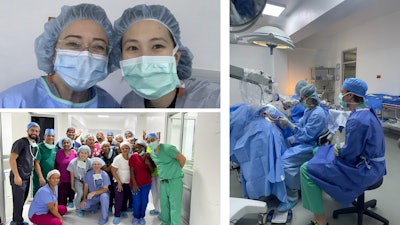
Nicholas Van Maele, MD, and William Ruffin, DO
Nairobi and Nakuru, Kenya

Ivy Maina, MD
University of Global Health Equity (UGHE) in Kigali, Rwanda
